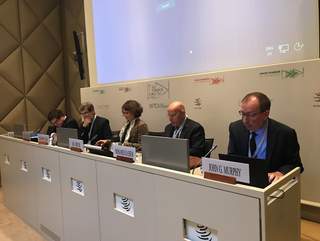
Panel on WTO Reform organized by the GBC at the 2019 WTO Public Forum © Eckart von Unger
Shaping the Global Economy: The BDI and the Global Business Coalition (GBC)
The GBC (formerly the B20 Coalition) was established in 2012 and brings together leading business associations from the major world economies. It operates as a worldwide exchange platform for national business communities. By providing a unique interface between policy makers, international organisations, and business, the GBC has become instrumental in representing the voice of business within the G20 process and many other global governance fora.
Major Impetus for Global Business Issues
In recent years, the core topics addressed by the GBC were trade and investment, digitalization, the reform of the WTO and resource efficiency, among others. The GBC responds to current developments by formulating joint positions and statements. For example, on the occasion of the G20 Summit in Osaka in June 2019, it released a joint statement on how to reform the WTO dispute settlement system.
The GBC regularly supports the Business 20 (B20) and Business 7 (B7), through which the G20 and G7, respectively, conduct a the dialogue with business. The GBC also was officially appointed as partner of the Japanese B20 Presidency. During the Turkish, the German and the Argentine B20 Presidencies, the GBC served as the network partner of various B20 taskforces, including those focusing on digitalization, energy and climate, Industry 4.0 and trade and investment topics. Network partners support Task Forces by sharing international business expertise and engaging their broad international constituency on the relevant issues. They enrich the B20 discussions and support wider advocacy efforts. Under B20 Saudi Arabia, the GBC serves as the network partner for the digitalization and trade and investment task forces.
Independence, Representativeness and the Commitment to Open Markets
Leading business federations from 14 of today’s major economies belong to the GBC. Together, they represent more than 6.7 million small, medium-sized and large enterprises. Only one federation from each country can become a member of the GBC, whereby it must fulfil certain conditions; these include independence from government, representativeness, an interest in global governance, and the commitment to the free market economy. From July 2016 until February 2019, BDI president Dieter Kempf hold the GBC Presidency. On the GBC Plenary Meeting in New Delhi in February 2019, he passed the baton to Miguel Acevedo, president of the Unión Industrial Argentina.
The members of the GBC are:
- Argentina: Unión Industrial Argentina (UIA)
- Australia: Australian Industry Group (AIG)
- Brazil: National Confederation of Industry Brazil (CNI)
- Canada: Canadian Chamber of Commerce (CCC)
- Europe: BusinessEurope (BE)
- France: French Business Federation (MEDEF)
- Germany: Federation of German Industries (BDI)
- India: Confederation of Indian Industry (CII)
- Italy: Confederation of Italian Industry (Confindustria)
- Spain: Confederation of Employers and Industries of Spain (CEOE)
- South Korea: Federation of Korean Industries (FKI)
- Turkey: Turkish Industry and Business Association (TUSIAD)
- United Kingdom: Confederation of British Industry (CBI)
- United States: US Chamber of Commerce (USCC)



